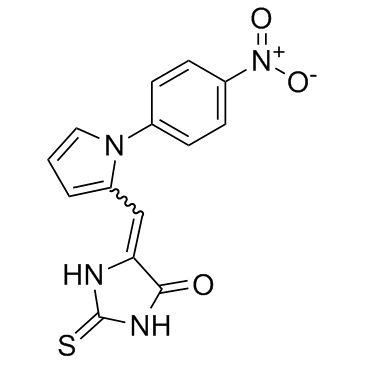| Description |
KY1220 is a compound that destabilizes both β-catenin and Ras, via targeting the Wnt/β-catenin pathway; with an IC50 of 2.1 μM in HEK293 reporter cells.
|
| Related Catalog |
|
| Target |
IC50: 2.1 μM (HEK293 reporter cells)[1]
|
| In Vitro |
KY1220 shows an IC50 of 2.1 μM in HEK293 reporter cells. KY1220 dose dependently decreases Wnt3a-CM-induced TOPflash reporter activation and mRNA expression of Wnt target genes CCND1 and MYC in HEK293 cells. In HEK293 cells, both β-catenin and panRas protein levels are similarly reduced in a dose-dependent manner after treatment with KY1220, whereas the mRNA levels of CTNNB1 (which encodes β-catenin), NRAS, KRAS and HRAS remain unchanged. K-Ras, which has a critical role in progression of CRCs, is also destabilized by KY1220 via polyubiquitin-dependent proteasomal degradation. KY1220 accelerates the degradation rates of both β-catenin and Ras in SW480 cell lines. Ras destabilization by KY1220 consequently inhibits the activities of both ERK and Akt, which are downstream effectors of Ras in SW480 cells harboring a KRAS mutation. The proliferation and transformation of the HCT15, SW480, D-WT and D-MT CRC cells are efficiently inhibited after treatment with KY1220[1].
|
| Cell Assay |
HCT15 or SW480 cells are treated with 25 μM KY1220 or KYA1797K or with control (DMSO) for 72 h. Cell proliferation is measured using the MTT assay. The absorbance of the formazan product is determined at 590 nm every 24 h[1].
|
| References |
[1]. Cha PH, et al. Small-molecule binding of the axin RGS domain promotes β-catenin and Ras degradation. Nat Chem Biol. 2016 Aug;12(8):593-600.
|
